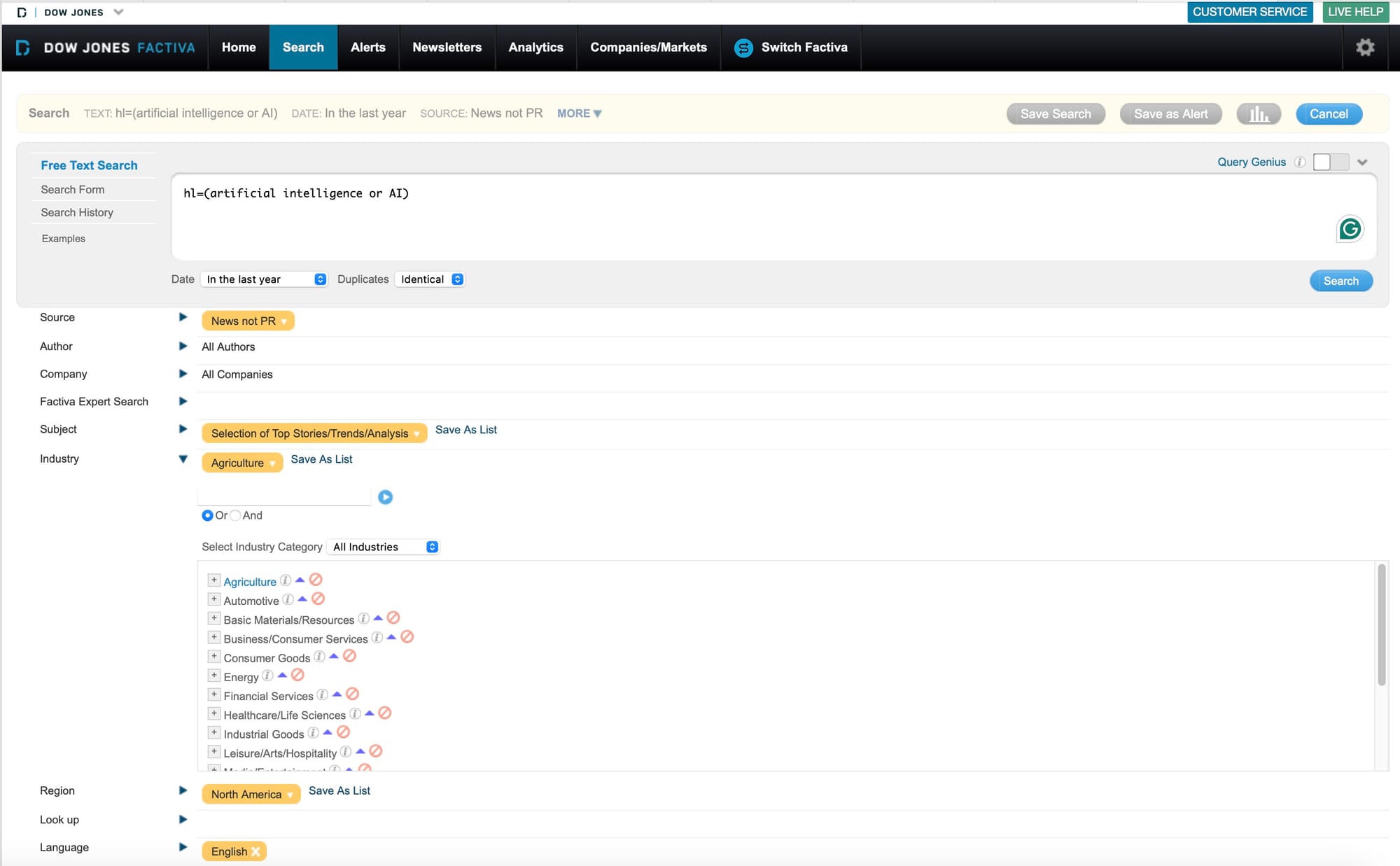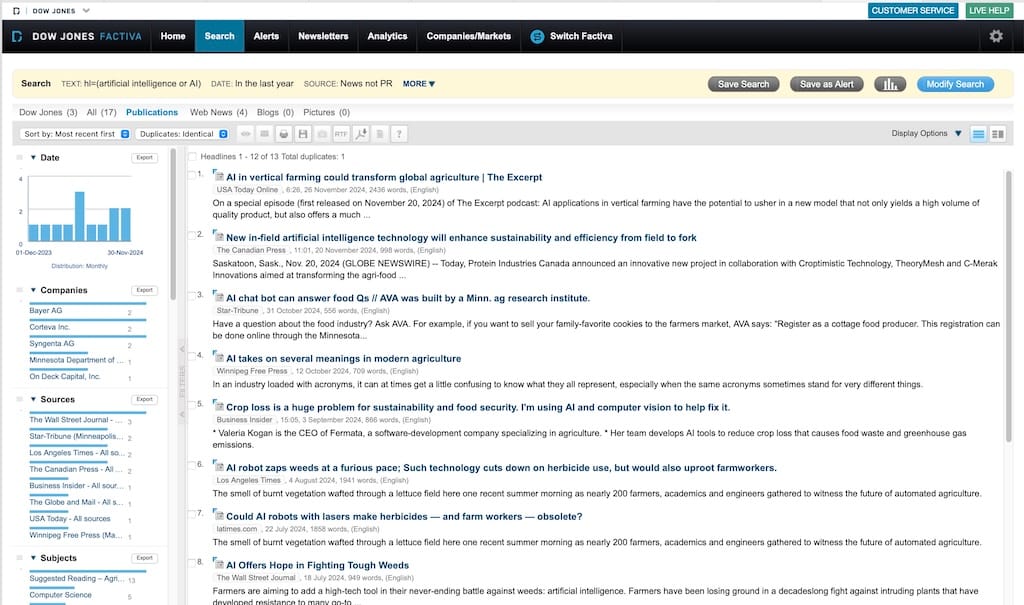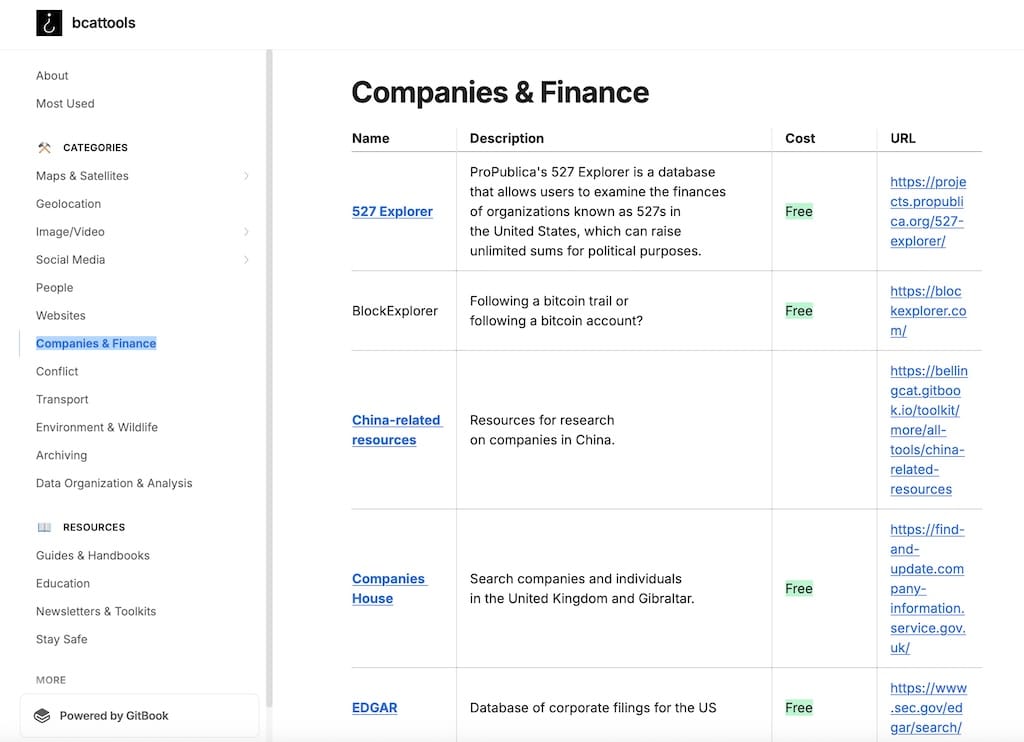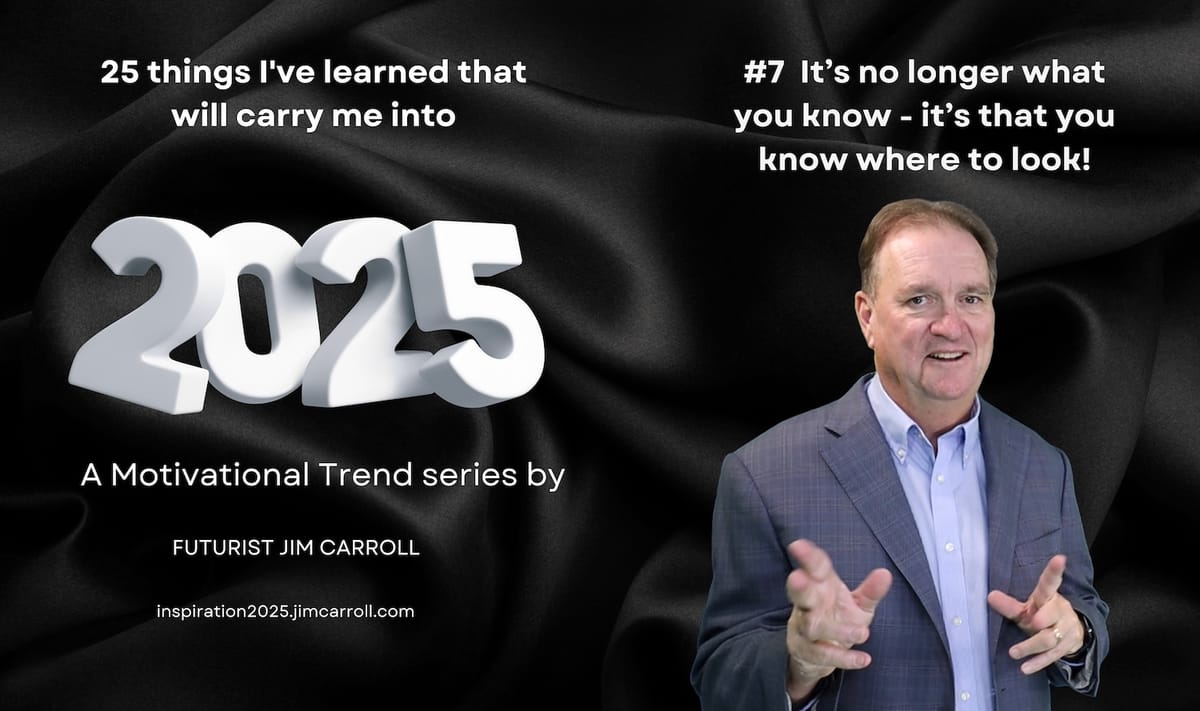"It’s no longer what you know - it’s that you know where to look!" - Futurist Jim Carroll
Futurist Jim Carroll is writing a series, "25 Things I've Learned That Will Carry Me Into 2025." He is putting this together based on his 30-year career as a futurist, trends, and innovation expert, advising leaders of some of the world's most prestigious organizations on how to align to a faster future. He intends for the series to provide valuable guidance to others eager to learn how to move through a year that promises to be volatile, unpredictable, and full of uncertainty. Each day, the post will go out on multiple mailing lists, social media networks, and to the Website https://2025inspiration.jimcarroll.com

One of the biggest problems with the information age is that there is too much information!
Information that many people don't know how to navigate successfully - but mastering that skill can be the key to moving forward. I know that is a key skill that has guided me through my career so far, and one that I intend to continue to enhance, particularly as both the promise and the peril of AI-based information search becomes a part of my life.
I was reminded of this reality just the other day while preparing my lists of topics for this series when I came across this social media post by a fellow who goes by the social media name MikeInTheFront. He's a pilot of an Airbus A220 with Air Canada and often posts a mix of information about both his professional life as well as hobbies. (I would guess his social media handle goes to the announcement he might make from the flight deck: "Hi, it's Mike in the front. I'm your pilot today.)
The first part of his post noted his new responsibility with the airline:
"Becoming a training captain in the new year and my motivation to read my manuals has increased dramatically for fear of being outgunned with knowledge. Time to hit the books"

But it was the second comment that hit the nail on the head in terms of today's knowledge reality:
Disclaimer: you’ll never know everything. But having good base knowledge or knowing where to find the information you need is a good start.
And that right there is one of the most important skills you need in the fast-moving world - increasingly, it's not just what you know, but increasingly, your ability to find what you don't know.
Having a good base knowledge of where to find the information you need is sometimes all you need.
That skill is a key part of what I've referred to as just-in-time knowledge. To thrive today, you've got to have advanced personal knowledge and navigation skills. This doesn't just involve being able to hit Google and do a search - it involves having multiple different information sources in your life.
In my case, it involves online news research services such as Dow Jones Factiva, and in a recent addition, newspapers.com, a service that allows me to do historical research on thousands of newspapers going back decades. The Factiva banner outlines what they offer (and what I pay a significant fee for!)
Global News Monitoring, Business Intelligence Platform
Identify opportunities, accelerate decisions and manage reputation with trusted businessintelligence.
Get unrivaled news from 33,000 global sources on a business intelligence platform covering 200 countries in 32 languages. Factiva’s millions of corporate profiles and advanced research tools provide timely insights for informed decisions across industries and regions, and accessible on mobile or via feeds and APIs.
I can't understate how powerful this tool has been in my knowledge skills, and what a role it plays in what I offer my clients. For example, this is how I construct a search about the impact of artificial intelligence in the agriculture sector:

This is what is known as a 'structured search' - in this case, I'm looking to find any articles that have been tagged as being about AI, from North American information sources, that involve actual news sources, not including press releases. The line HL=(artificial intelligence or AI)? That has me looking for articles where those search terms must appear in the actual headline of the article - a way to restrict my search to potential articles of relevance. Not only that, but the article has been tagged as being very relevant (a "top story") to the topic.
With that, it's found me 12 articles from the last year - letting me get right to the important knowledge I need to know without wading through a lot of crap. I'll take this over Google any day!

What about your world? Think about your personal information universe - it might involve specialized medical, legal, or other professional research services that have been made available to you. In many situations, associations and companies are setting up specialized online research archives related to their mission - and if that's a part of your world, make sure you recognize the power to be found by using them. Take the time to learn them - double down on your knowledge investment. A great doctor, lawyer, landscape architect, manufacturing engineer, or software programmer doesn't just know the base knowledge that came with their career training - they are the master of the specialized information search tools that are a part of their professional lives.
The whole issue of knowledge training also goes to taking the time to discover useful information research sources among the millions of specialized directories that are out on the WEB. I recently came across a post from Bellingcat - they are a group that specializes in what is called "Open Source Intelligence," or OSINT. That involves the use of public information sources to undertake highly specialized online research. A recent post about their new directory summarized what they've made available.
Have you ever struggled to find a tool that does exactly what you need? Do you know the feeling of spending hours trying to figure out how to use a tool just to realise that the key features you are interested in are not working anymore, or that the previously free product has turned into a paid one that is more expensive than you can afford?
You are not alone. More than 80 percent of open source researchers that participated in two Bellingcat surveys indicated that finding the right tools can be challenging.
This is where our new Online Investigations Toolkit comes in: it not only helps you discover tools in categories like satellite imagery and maps, social media, transportation or archiving, but is also designed to help researchers learn how to use each tool by providing in-depth descriptions, common use cases and information on requirements and limitations for each toolkit entry.
Most of the tools included can be used for free.
Find the Right Open Source Research Tools With Bellingcat’s New Online Investigations Toolkit
September 24, 2024, OSINT
Visiting the directory they've established provides a treasure trove of information. For example, here's a pathway to finding detailed corporate information online - what you won't necessarily discover with a simple Google search.

Bottom line? You should think of the ability to find information as one of the most important skill sets that you have.
It's worked for me - so much so that during the very early 90s, I offered a 'Competitive Intelligence" research service - wherein I was doing online research for various private investigators, companies, and organizations. (At one time, Air Canada was a client, having me do some very detailed research related to some M&A activities!)
Some of the most successful people I've met have mastered the unique skill set of detailed information research. I know that in my case, it has very much defined the overall success I; 've had throughout my career. If I'm going in to speak to an agricultural, manufacturing, legal, or other organization, I've got extremely detailed, specific, focused research that directly relates to them. It's so powerful that after one talk in the agricultural sector, one fellow came up to me and asked how long I had been a farmer.
It was at that moment in time that I came to know that my search skills define me.
They should define you too - just as they seem to be defining the career trajectory of a fellow like MikeInFront.
In this acceleration economy, success isn't about having all the answers - it's about knowing where to find them. The organizations and individuals who master this skill will be the ones who thrive in the face of exponential change.
Futurist Jim Carroll first discovered the power of online information search around 1983.

